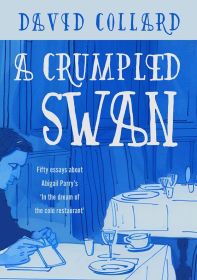
“Poetry has, I believe, made me more like the person I’ve always aimed to be – not better than anyone else, but better than the person I would otherwise have been.”
David Collard is respected within literary circles for his clarity and erudition. In A Crumpled Swan he focuses his intellect on a single poem by Abigail Parry: ‘In the dream of the cold restaurant’. Over the course of a year he composed fifty essays inspired by a close reading of this work. The resulting collection is both intense and entertaining, offering as it does thoughts on Collard’s highly detailed interpretation on a line by line basis, and on poetry in general. As well as any emotional response he covers technicalities. The book may therefore appeal to both those of an academic bent and the more casual reader.
“I will be sharing a lot of personal opinions based on a lifetime of reading and reflection, opinions which are entirely valid but have no authority whatsoever. I don’t expect you to agree with much of what I have to say”
Following a brief introduction the text of the poem is provided in its entirety. The first essay then makes the request that the reader reread it out loud. Poetry as a form benefits from multiple readings, enabling greater immersion in chosen cadence and possible meanings. Collard covers these aspects in depth within later essays, interpreting form and significance of language used, alongside his own explications.
Clearly these essays are personal. In the second, Collard provides a few details on his background, something he returns to occasionally later on. By the third essay he is considering what poetry can offer. He then dives into the poem, thus beginning his ruminations from close reading.
“There is no reason that a profound poem should be obscure”
Collard writes with insight and exactitude. As a casual reader of poetry I could not always see where he was coming from or going. He spends some time linking aspects of the poem to the classical Greek myth of Leda. I found this oblique and somewhat missing the point of what I personally seek in poetry – an ability to connect with the words and gain insight. Clearly I was missing the power the poem has had during Collard’s multiple readings along with the impressive background knowledge he brings to it.
“I may be running the risk of imposing an over-elaborate interpretation on lines which are all, on the face of it, quite straightforward.”
Nevertheless there was much within these pages that I was happy to engage with and learn from. That my interpretations of the poem after two or three readings differ need not matter as we are individual readers carrying our own priorities.
The poem is set in a dream and Freud is referenced in essays with some regularity. There are also references to sexual acts that I could not see were necessary and found somewhat off-putting. As with reading poetry, reading these essays will trigger a personal response.
The education provided on literary terms alongside references to other writers and their works brought to the fore Collard’s expertise and my lack. The deep dive into technicalities of poetry will clearly appeal more to some than others.
“Is it any good? How can we tell? These are big questions.”
What we have here is serious writing but it also includes essays offering lighter relief. On redundancy details the author’s attempts to converse with ‘an AI companion’ – amusing although not in any way impressive, typical of the current state of AI.
I did wonder what Parry would make of someone immersing themself so deeply in her poem and this too is considered. I enjoyed Collard’s musing on and investigative exploration around what poetry is for.
The essays on ‘good poetry’ and ‘bad poetry’ were entertaining. Those that survive the test of time may not necessarily be deserving, but then that judgement will always be subjective and may lack an appreciation of why a poem appeals to a wider audience.
As well as the poem being dissected and studied, the texts of two earlier poems by Parry are included in appendices. I say earlier, but really how does one date a poem given its gestation period? ‘In the dream of a cold restaurant’ took over a decade to prepare for publication.
A Crumpled Swan is not a book to be rushed. There is much to consider and time should be given to allow reflection on Collard’s reasoning and exhortations. I gained much from my perusal including enjoyment. More than that, though, any reader will ever after carry with them the ability to read poetry through a clearer lens.
A Crumpled Swan is published by Sagging Meniscus








